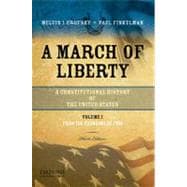A March of Liberty: A Constitutional History of the United States, Third Edition, is a clearly written, comprehensive overview of American constitutional development. Covering the country's history from the founding of the English colonies up through the latest decisions of the Supreme Court, this two-volume work presents the most complete discussion of American constitutional history currently available. Authors Melvin I. Urofsky and Paul Finkelman successfully blend cases and court doctrines into the larger fabric of American political, economic, and social history.
They discuss in detail the great cases handed down by the Supreme Court, showing how these cases played out in society and how constitutional growth parallels changes in American culture. In addition, they examine lesser-known decisions that played important roles in affecting change, and also provide in-depth analyses of the intellects and personalities of the Supreme Court justices who made these influential decisions.
Updated with the most recent scholarship, the third edition of this textbook offers more cases on a broader range of issues including the environment, labor, civil rights, and Native American concerns. It now presents new selections on decisions, statutes, and constitutional developments from the first decade of the 21st century--like the USA PATRIOT Act, presidential signing statements, same-sex marriage, reproductive rights, campaign financing, and firearms regulation. The text reflects the current trends in American constitutional history by employing a holistic approach that integrates the decisions of the state and lower federal courts with the decisions of the Supreme Court.
A March of Liberty, Third Edition, features useful supplemental materials including the text of the Constitution, a chronological list of Supreme Court justices, an appendix of the names and years for each Supreme Court justice, and suggested further readings. Gracefully written and clearly explained, this popular two-volume set is indispensable for courses in American constitutional history and law.
A March of Liberty is clearly written, comprehensive overview of American constitutional development. It presents the most complete discussion of American constitutional history currently available.
This textbook shows how cases played out in society and how constitutional growth parallels changes in American culture.It also contains in-depth analyses of the intellects and personalities of the Supreme Court justices who made these influential decisions








